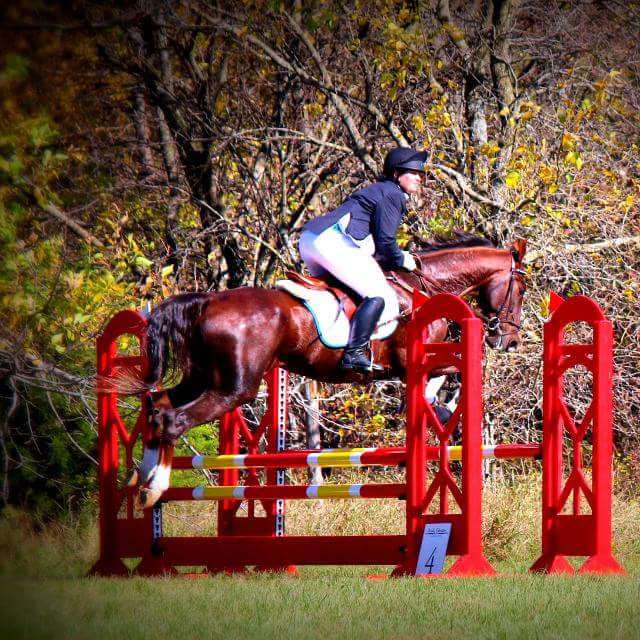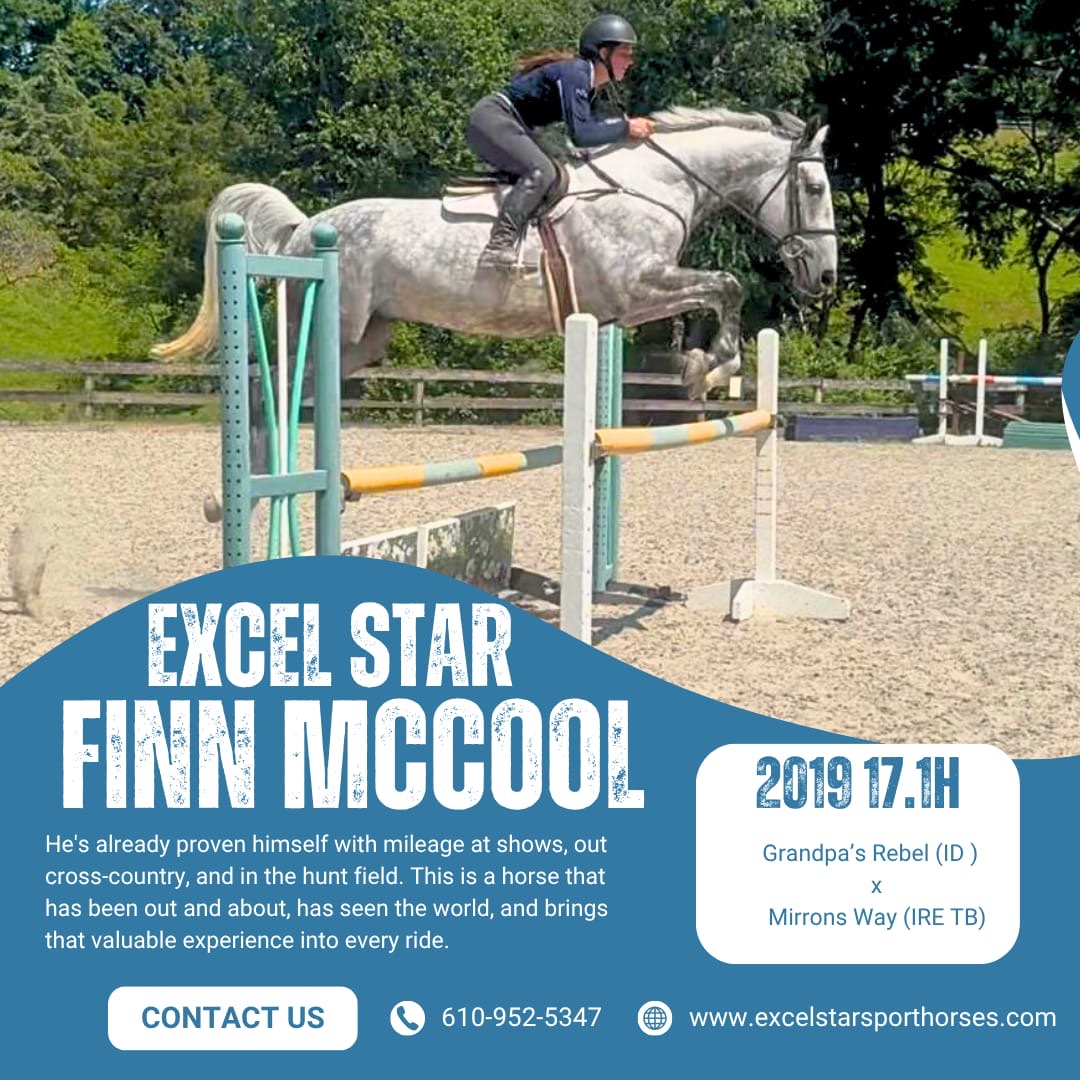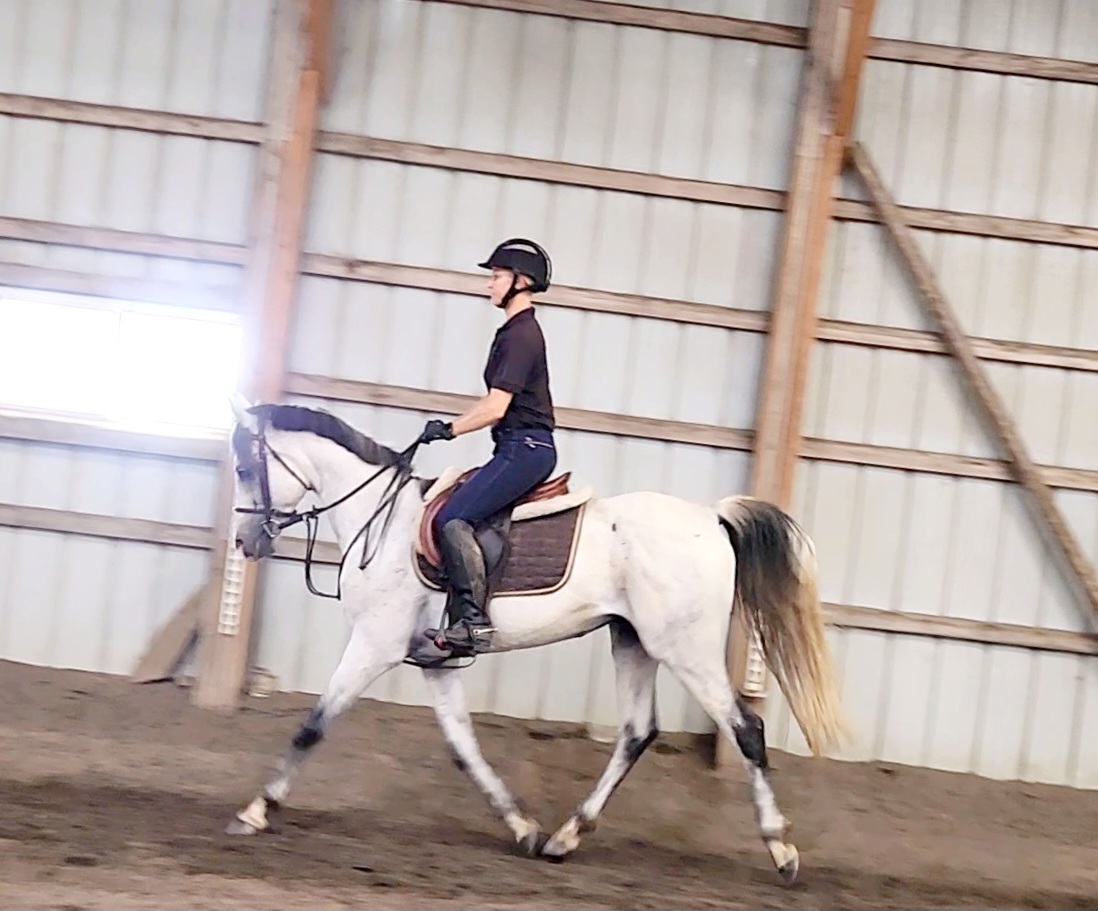Welcome to the new Amateur’s Corner on Eventing Nation! The goal of this series is to gather perspective, experience, and advice from the hardworking and dedicated amateurs that populate our sport. We’ll be doing Q&A profiles with amateurs from all walks of life, hoping their experiences can help others working to balance horses with, well, the rest of life. Do you want to participate in an Amateur’s Corner Q&A? Send your tip to [email protected]. We kick things off this week with 32-year-old Nancy Fronczak, an occupational therapist from Kansas City, Mo. (Area IV).

Nancy Fronczak and RendezVous. Photo by Chloe DeYoung.
EN: How long have you been eventing? What or who gave you the “eventing bug”?
NF: I grew up in Hinsdale, a suburb of Chicago. My parents are not horse people, so it took years of horse obsession and going on horseback riding trips on vacation to convince them to let me go to a horse-intensive summer camp. When I got home, I was resolved to make horses a part of my life. I asked my mom if I could take horseback riding lessons and she said absolutely not – it would be too expensive. So, being the resourceful teenager I was, I started volunteering at the therapeutic horseback riding center in town, the Hanson Center. There, I learned about horses – how to care for them, how to be safe around them – and was introduced to my love of occupational therapy. Eventually, my parents saw that the horses were not going away. They said that I could take horseback riding lessons if I could afford to pay for them. I spent my summers as a cashier and lifeguard at the local pool. When I would get my paycheck every week, I would immediately give it to my mom so she could pay for my riding lessons. When I applied for the National Honor Society as a senior in high school, I had logged over 500 volunteer hours at the Hanson Center.
When I went to college at the University of Missouri in Columbia, MO, I had no money. I searched for a barn that would let me clean stalls and help out in exchange for lessons, eventually meeting local trainer Kris Maloney (now Wallace) and buying from her a not-so-crazy Saddlebred, Coco. He and I had a blast! We did lots of stupid things and he taught me a ton. I had always been interested in eventing. I did all the research, read the rule book, and found Queeny Park Horse Trials (in St. Louis, Mo.). I went to my first event there in 2011. We had no idea what we were doing, but we had the time of our lives! We had caught the eventing bug. We went to several other events and learned new things at every single one. Eventually, I graduated college with my master’s degree in occupational therapy and moved to Kansas City.
After retiring Coco and working with another young horse, Deiter, before he made the switch to dressage, Chris and I knew I would need another eventing horse. On the way home from an event one weekend, we saw an ISO facebook post describing Dieter perfectly and another post with a sale ad for a draft cross mare, RendezVous. “Dezi” was perfect for me! Like Deiter before her, she has helped me learn how to start a completely green horse. I got to introduce her to jumping, cross country, dressage, and horse showing. She has come a long way from the horse that would run off with me every time I would ask her to canter.
My goal for 2020 was to start showing Dezi in the Novice divisions, but I knew there was something holding me back. It was my weight. I have been overweight my whole life. Every time I would take a horse to Novice, I would feel like my weight was what was holding us back from greater success. I felt like I owed it to Dezi to drop the weight and give us as much of a fighting chance as possible. I made a goal that I wouldn’t show Novice or even school Novice cross country until I was under 200 pounds. I joined the “No BS” weight loss program with Corinne Crabtree and learned how to truly care for myself- physically, emotionally, and mentally. In 2020, I lost 75 pounds! I could finally show Novice without feeling like my weight was affecting my riding and my horse. The weight loss helped me feel more in tune with where my body is in space and helped me improve my riding to an even greater extent. My 2021 goal is to have a whole season of success at the Novice level and even think about asking training questions.
Outside of riding, I am an occupational therapist in inpatient rehabilitation. I’m lucky to have a job in healthcare that allows me to work 6:30 am – 3 pm, Monday through Friday with no weekend requirement. And I have very flexible paid time off with availability to comp days on the weekends if I want to take a day during the week. That’s usually how I am able to take time off for horse shows. I take the Friday of the show off work and work the Sunday prior to make up for it so I can save my paid time off for longer shows (like AEC) or vacations.
EN: Tell us about your “work/life/ride balance”. What does this mean to you?
NF: My work/life/ride balance is very different during different times of the year. Typically, my weekdays consist of working, driving to the barn, riding, driving home, and then going to sleep. I love to listen to podcasts (typically self-development) during my hour drives to and from the barn. On nights when I don’t ride, I play pool with my fiancé. On the weekends, if I’m not showing, I spend the mornings relaxing, planning my week, and meal prepping to set myself up for success during the week, because it does tend to be busy. I’ll usually ride in the afternoon on the weekends. During the winter, I tend to have more down time. I am a self-admitted fair weather rider who hates the cold and having to cool down a sweaty draft horse with full body hair. I improve my pool game and spend more time with friends and fiancé so that in the spring and summer, when my time starts to revolve more and more around horses, they don’t feel neglected. The people in my life know that horses will always be a major part of my life and a high priority, particularly during show season. They know not to expect me to be around as much in the weeks leading up to horse shows. During show season, I make an effort to have one night a week that I devote to my fiancé. My friends know that whether I can spend time with them depends a lot on the weather. If it’s rainy and cold, my chances of being with my people increases. I just try to be as open and honest about my time constraints as possible, and I’m lucky to have people in my life who support me and understand my passions.
EN: What is your best advice as an amateur rider? How do you “make it work”?
NF: My best advice to amateur riders is to not be too hard on yourself. Just do the best you can and speak nicely to yourself. It’s easy to compare yourself to people on social media that have more time or more money or more resources available to them. It’s easy to feel like you’re not doing enough or devoting enough time to the horses and the barn, but the horses don’t care. At the end of the day, they’re happy to see you and your pocket full of treats. Horses are surprisingly resilient. There is nothing wrong with taking your time moving up the levels… if that’s even a goal. There is no rush. That’s the best advice that I’ve been given- take your time up the levels and enjoy the journey. The bond with the horse and the joy of being that weird horse girl are ultimately why we do this. Enjoy every moment snuggling your horses’ necks, making fun of their silly antics, and just spending time with them. Not everyone has the privilege of having horses in their lives. We are the lucky few.
EN: What drives you/motivates you the most?
NF: My biggest motivator is that feeling of complete trust and exhilaration on the cross country course. Whenever I’m feeling overwhelmed or like I’m spreading myself too thin, I’ll pull out old Go-Pro videos from cross country and they remind me why I’m doing all this.
EN: In one sentence, what does the sport of eventing mean to you?
NF: In one sentence, the sport of eventing is a sport that brings some of the best people and horses together to work their asses off and experience some of the highest highs and the lowest lows possible.
EN: What is something with the sport that could evolve to better serve its amateur riders?
NF: I think the sport of eventing does a fairly good job serving amateur riders. I like that there is a different points scale for amateurs as compared to professionals. I think it would be interesting to reward amateurs and competitors in general for good horsemanship at the recognized events, maybe in a manner similar to Pony Club. I also think it would be nice to have a greater presence of adult amateurs and the adult rider programs on social media. The young rider programs are doing a great job, but it’s a bit disappointing not to see similarities for adult riders & adult amateurs who make up a large portion of the sport.





















